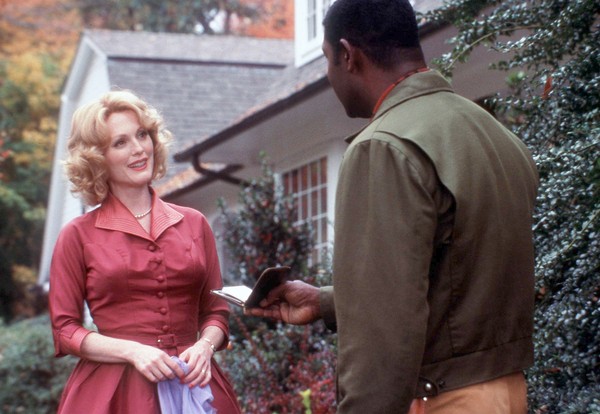Movie review by Greg Carlson
His most accomplished film to date, director Todd Haynes’ “Far from Heaven” is certainly one of 2002’s strongest American movies, and is likely to bring an Academy Award nomination to actress Julianne Moore. Lavishly, meticulously recreating the mise-en-scene of 1950s Technicolor melodramas, Haynes aestheticizes and fetishizes his raw materials, from the stilted, overly formal dialogue that masks and clouds the intended meaning of the words his characters speak to the lavender-hued scarf that blows down from the crimson-leaved treetops. Haynes has self-consciously filtered every detail of his movie through the lens of artifice, and the result is a compelling portrait that shows just how little things have changed over the last forty-five years or so.
“Far from Heaven” is essentially a reworking of a handful of Douglas Sirk movies, particularly “All That Heaven Allows,” in which forty-something widow Jane Wyman faces social ostracism for dating her gardener, played by Rock Hudson, a man some fifteen years her junior. Haynes shrewdly rethinks a handful of the story’s underlying thematic engines, making his central character a young wife to a closeted homosexual (Dennis Quaid) rather than a widow. The gardener with whom she finds comforting kinship and support is an African-American (Dennis Haysbert). Fortunately, the director also chose to align himself with Sirk’s incomparable appreciation for subtext.
“Far from Heaven” takes place in 1957 in a suburb of Hartford, Connecticut, where Cathy and Frank Whitaker radiate the values of Eisenhower-era contentment as “Mr. and Mrs. Magnatech” – a title referring to Frank’s job as an executive with a TV industry firm, bestowed upon the pair by the gossipy local society pages. On the surface, Cathy appears to be the model of the happy homemaker, but one night she takes dinner to Frank’s office and discovers him kissing another man. Frightened, confused, and shattered, Cathy internalizes and represses her feelings, putting on a brave face in order to maintain the illusion of the perfect family and the perfect life.
Meanwhile, Cathy begins to grow close to her gardener, a widower with an eleven-year-old daughter. His name is Raymond Deagan, and because his skin is not the same color as Cathy’s, tongues start to wag as soon as the two are seen talking to one another. Haynes is masterful in sketching (with Sirkian precision and skill) the kind of oppressive nexus of homophobia, racism, and classism that continues to choke American society, and with a few reaction shots here and a few well-selected lines of dialogue there, we share in Cathy’s misery and frustration over how things can become so messed up so quickly. Haynes never comes close to allowing Cathy to act on any physical desire for Raymond – despite the intensity of their relationship – and her emotional disintegration as a result of this is palpable.
“Far from Heaven” succeeds because Haynes loves his characters, and lets them lead the action (the director conceded that he was worried about how audiences might misinterpret his emotional sincerity). Quaid and Haysbert are fantastic, but Moore is magnificent, and turns in one of the finest performances of her already impressive career. Her Cathy is an unusual and surprising creation, a woman who does everything she can to loosen the shackles of her existence even as she recognizes the inevitability of her failure. It is tragic to contemplate Cathy’s fate, especially after all of the bold actions she takes to avert the cruelty of her circumstances, but it is precisely the fierceness of her struggle that makes her so great.
